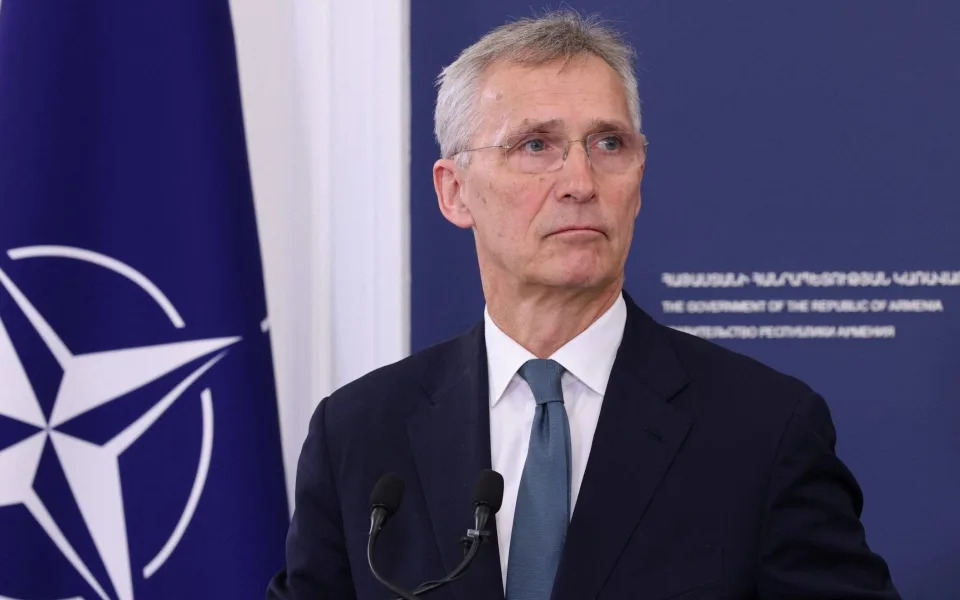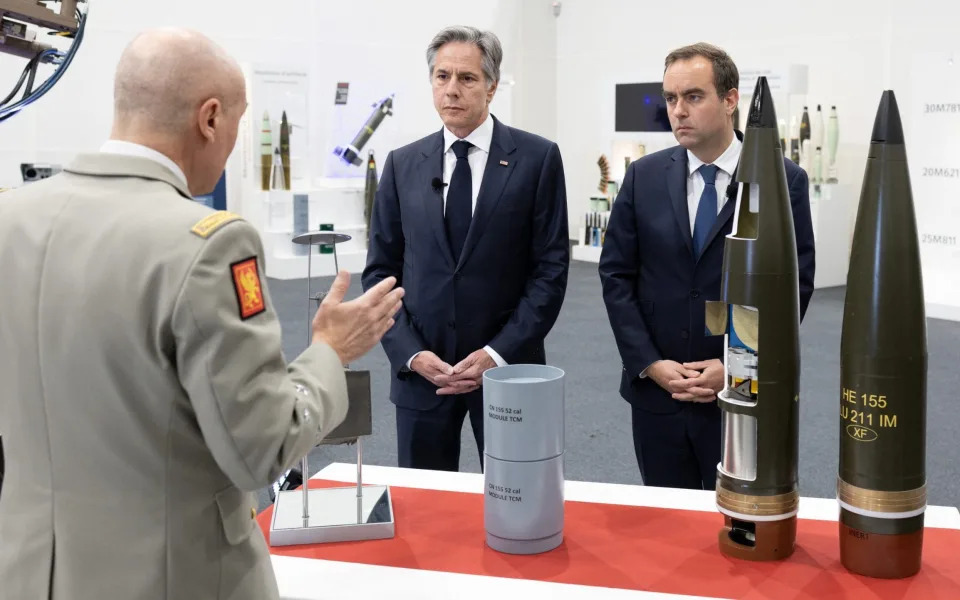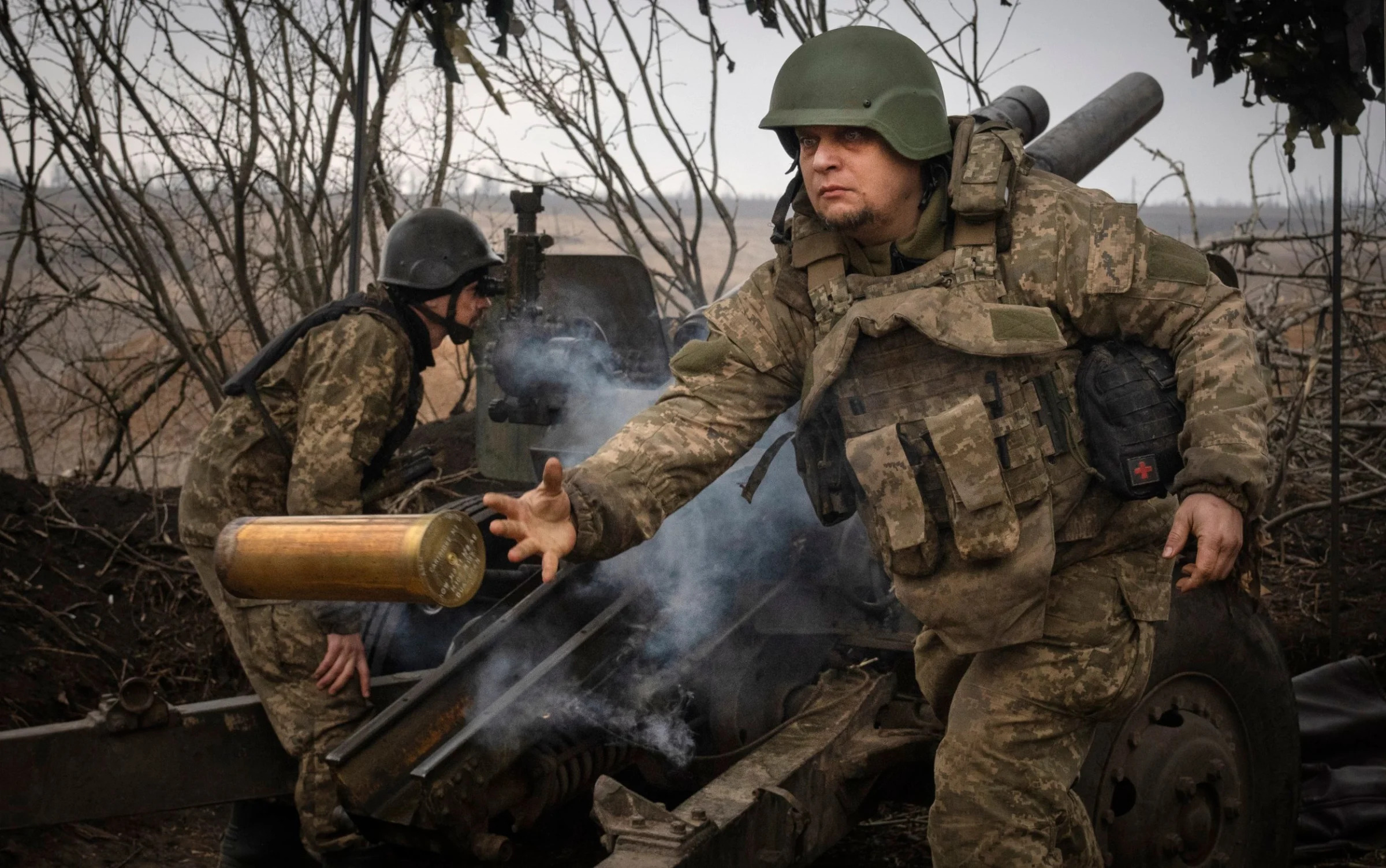NATO ministers mull 100 billion euro military fund for Ukraine

NATO foreign ministers meet on Wednesday to discuss how to put military support for Ukraine on a long-term footing, including a proposal for a 100 billion euro ($107 billion) five-year fund and a plan seen as a way to "Trump-proof" aid for Kyiv.
The proposals by NATO Secretary General Jens Stoltenberg would give the Western alliance a more direct role in coordinating the supply of arms, ammunition and equipment to Ukraine as it fights Russia's invasion, diplomats say.
The plans will be discussed during a two-day meeting in Brussels that will celebrate the 75th anniversary of the founding of the North Atlantic Treaty Organization and prepare for a summit of alliance leaders in Washington in July.
The meeting will provide insight into how far Ukraine's European allies are willing to go to support Kyiv's war effort as a military aid package for Ukraine worth some $60 billion remains stalled in the U.S. Congress.
Under the plans, NATO would take over some coordination work from a U.S.-led ad-hoc coalition known as the Ramstein group - a move designed in part to guard against any cut in U.S. support if Donald Trump returns to the White House, diplomats said.
Until now, NATO as an organisation has focused on non-lethal aid for Ukraine out of fears that a more direct role could trigger an escalation of tensions with Russia. Its members have provided billions of dollars in arms on a bilateral basis.
Diplomats said there was a growing view within NATO that it was time to put military aid to Ukraine on a more sustainable footing and NATO was best placed to do that.
Some said that threats by Russian President Vladimir Putin that he would regard various steps taken by NATO allies as escalatory - such as providing tanks and other advanced weapons systems - had not led to retaliation against them.
U.S. Secretary of State Antony Blinken, who will attend the Brussels meeting, said in Paris on Tuesday that NATO was looking at measures that could serve as the "necessary bridge" to membership of the alliance for Ukraine.
NATO has stated that Ukraine cannot join while it is at war with Russia but that it will become a member at some point.
NATO declined to comment in detail on Stoltenberg's proposals but a NATO official said the ministers would "discuss the best way to organise NATO's support for Ukraine, to make it more powerful, predictable and enduring".
"No final decisions are to be taken at the April ministerial meetings, and discussions will continue as we approach the Washington summit in July," the official said, declining to be named.
EARLY STAGE
Diplomats cautioned that discussions on the proposal were at an early stage and it was unclear whether the 100 billion euro figure would be accepted or how it would be financed. NATO decisions require consensus among the alliance's 32 members.
"It goes some way to protecting in case of Trump. But it is impossible to create something Trump-proof," another diplomat said of the plan to transfer work to NATO from the Ramstein group, named after a U.S. air base where it often meets but known formally as the Ukraine Defense Contact Group.
"A fund of 100 billion looks very optimistic," the diplomat added.
The meeting comes as NATO is seeking a new leader to succeed Stoltenberg, who has been in post for nearly 10 years.
Dutch Prime Minister Mark Rutte has the backing of a some 90% of NATO members for the job - including the United States, France, Britain and Germany - according to diplomats.
But he faces opposition from Hungary - which objects to his criticism of Prime Minister Viktor Orban's government - and a late challenge from Romanian President Klaus Iohannis.
Some diplomats had hoped to choose Stoltenberg's successor at the Brussels meeting but they said more time would now be needed. Several expressed confidence, however, that Rutte would be appointed in the end.
Nato may send weapons directly to Ukraine to ‘shield’ support if Trump wins presidency
Ukrainian soldiers fire a M101 howitzer towards Russian positions at the frontline -
Nato could send weapons and ammunition to Ukraine for the first time under a plan to “Trump-proof” Western support for the war-torn nation.
The $100 billion (£79.5 billion) “trust fund” scheme would see the transatlantic military alliance take charge of donations previously sent on an individual basis.
It would likely require European Nato members to commit a greater proportion of money and weapons than they currently do, which officials believe will help placate Donald Trump.
Trump supporters have blocked a major tranche of aid to Ukraine from passing Congress as he rails against Nato members who do not spend enough on defence. Officials fear Ukraine funding could further dry up if Mr Trump is re-elected in November.
Jens Stoltenberg, Nato’s departing secretary-general, has privately told member states a shift in the alliance’s donations policy is needed to “shield it [aid to Ukraine] against the winds of political change”, a tacit admission that American support is not guaranteed.
Details of the plan are still under discussion, but officials expect Europe to agree to fund the majority of long-term aid packages.
“It needs to be some sort of trust fund construction, but one where you all agree to do this based on a common funding distribution key,” a senior Nato diplomat said.
“It solves a burden-sharing problem,” the source added.
But plans for Nato to directly give weapons to Ukraine would be seen in Moscow as escalatory given Vladimir Putin’s attempts to paint his invasion of Ukraine as a bid to stop Nato expanding its borders.

In early discussions over the “Nato Mission Ukraine” scheme, a number of allies have raised issues over a previously agreed red line to directly deliver lethal aid to Kyiv.
“If we are to do this, we have to cross the Rubicon in that Nato will have a role in coordinating the supply of lethal support to Ukraine,” the senior diplomat said.
Under the scheme, Nato commanders would take over the reins of power of the Ukraine Contact Group of 50-plus allies co-ordinating weapon deliveries to Kyiv previously managed by the Americans.
It would be underpinned by an offer of $100 billion in funding over the next five years to improve the state of Ukraine’s armed forces with weapons and training.
It has been billed as a “bridge” to Nato membership for Ukraine, which US officials have warned will not be presented with a roadmap to accession of the alliance at a summit in Washington in July.
Mr Stoltenberg has proposed that it would be funded using a “common distribution key” to demonstrate to critics in Washington that European nations are pulling their weight.
Under one plan, Germany (16 per cent), Britain (11 per cent) and France (10 per cent) would be expected to contribute the lion’s share of the war chest, whereas the United States would be asked to stump up 16 per cent.
The Baltic countries have proposed that the money being channelled into Ukraine’s war effort could be increased further if Nato countries commit to spending at least 0.25 per cent of GDP on aid for Kyiv.
Republican supporters of former president Donald Trump have argued that the US should not commit to any new aid package until Europe demonstrates it is taking on more of the burden of supporting Ukraine.
A $60 billion US aid package is currently being held up by political wrangling by a handful of Republicans in Congress demanding more domestic legislation to tackle illegal immigration.
Ukrainian and US officials have repeatedly warned ammunition shortages in part triggered by the absence of American support is resulting in Russian gains on the battlefield.

The aim is to finalise the deal ahead of a crunch summit to mark Nato’s 75th anniversary summit in Washington just days before Mr Trump’s expected coronation as the Republican candidate for president.
To further appease Americans uneasy about their support for Ukraine, Volodymyr Zelensky will be advised to accept the deal, even though it contains no concrete promise of Nato membership for Kyiv.
At a summit in Vilnius last year, Ukraine’s president caused a storm when he branded Nato “absurd” for refusing to offer his country swift entry into the military alliance once the war is over.
The new offer to Ukraine also serves as an official confirmation by its Western allies that the war with Russia will continue for years to come.
With Ukraine losing ground across almost 600 miles of front line, Nato officials believe deepening support for Kyiv is needed to demonstrate previous donations have not been futile.
- Questions and Answers
- Opinion
- Story/Motivational/Inspiring
- Technology
- Art
- Causes
- Crafts
- Dance
- Drinks
- Film/Movie
- Fitness
- Food
- Jocuri
- Gardening
- Health
- Home
- Literature
- Music
- Networking
- Alte
- Party
- Religion
- Shopping
- Sports
- Theater
- Wellness
- News
- Culture
- War machines and policy


